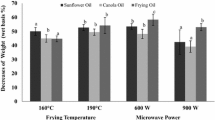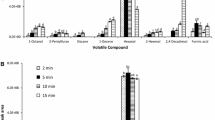Abstract
The contents of total trans FA of sunflower oils at different stages of refining processes were determined by capillary GLC. The contents of 18∶1, 18∶2, and 18∶3 trans acids were 0.22±0.03, 2.31±0.23, and 0.03±0.01%, respectively, in physically refined sunflower oils, and 0.05±0.01, 0.69±0.26, and 0.02±0.01%, respectively, in chemically refined sunflower oils. The total trans FA contents drastically increased at the end of the physical refining process. The total trans FA contents of chemically refined sunflower oils were <1%. Because of the high temperature applied in the last stage of physical refining, the content of total trans FA was higher than in chemically refined sunflower oils. The last-stage conditions should be carefully evaluated to reduce the formation of trans FA during physical refining.
Similar content being viewed by others
References
Cvengros, J., Physical Refining of Edible Oils, J. Am. Oil Chem. Soc. 72:1193–1196 (1995).
Jawad I.M., S.P. Kochhar, and B.J.F. Hudson, Quality Characteristics of Physically Refined Soya Bean Oil: Effects of Pretreatment and Processing Time and Temperature, J. Food Technol. 18:353–360 (1983).
Karaali, A., The Effects of Refining on the Chemical Composition of Turkish Sunflower Seed Oil, Fette Seifen Anstrichm. 87:112–117 (1985).
Hénon G., Z. Kemény, K. Recseg, F. Zwobada, and K. Kővári, Degradation of α-Linolenic Acid During Heating, J. Am. Oil Chem. Soc. 74:1615–1617 (1997).
Ruiz-Mendez, M.V., G. Marquez-Ruiz, and M.C. Dobarganes, Relationships Between Quality of Crude and Refined Edible Oils Based on Quantitation of Minor Glyceridic Compounds, Food Chem. 60:549–554 (1997).
Schwarz, W., Formation of trans Polyalkenoic Fatty acids During Vegetable Oil Refining, Eur. J. Lipid Sci. Technol. 102: 648–649 (2000).
Kellens, M., Current Developments in Oil Refining Technology, Technical Report De Smet-Belgium, Antwerp, Belgium, 1997, pp. 35–48.
Official Methods and Recommended Practices of the American Oil Chemists’ Society, 4th edn., American Oil Chemists’ Society, Champaign, 1992, Method Ce 2-66.
Ferrari, R.Ap., E. Schulte, W. Esteves, L. Brühl, and K.D. Mukherjee, Minor Constituents of Vegetable Oils During Industrial Processing, J. Am. Oil Chem. Soc. 73:587–592 (1996).
Bruehl, L., Determination of trans Fatty Acids in Cold Pressed Oils and in Dried Seed, Fett/Lipid 98:380–383 (1996).
Wolff, R.L., Further Studies on Artificial Geometrical Isomers of α-Linolenic Acid in Edible Linolenic Acid-Containing Oils, J. Am. Oil Chem. Soc. 70:219–224 (1993).
Segers, J.C., Pretreatment of Edible Oils for Physical Refining, Ibid. 60:214A-216A (1983).
Jawad, I.M., S.P. Kochhar, and B.J.F. Hudson, The Physical Refining of Edible Oils. 1: Effect on Component Fatty Acids and on Triglycerides, Food Sci. Technol. 17:289–293 (1983).
Ackman, R.G., and S.N. Hooper, Linolenic Acid artifacts from the Deodorization of Oil, J. Am. Oil Chem. Soc. 51:42–49 (1974).
Čmolik, J., W. Schwarz, Z. Svoboda, J. Pokorný, Z. Réblová, M. Doležal, and H. Valentová, Effect of Plant-Scale Alkali Refining and Physical Refining on the Quality of Rapeseed Oil, Eur. J. Lipid Sci. Technol. 102:15–22 (2000).
Greyt, W., O. Radanyi, M. Kellens, and A. Huyghebaert, Contribution of trans-Fatty Acids from Vegetable Oils and Margarines to the Belgian Diet, Fett/Lipid 98:30–33 (1996).
Bruggen, P.C., G.S.M.J.E. Duchateau, M.M.W. Mooren, and H.J. van Oosten, Precision of Low trans Fatty Acid Level Determination in Refined Oils. Results of a Collaborative Capillary Gas-Liquid Chromatography Study, J. Am. Oil Chem. Soc. 75:483–488 (1998).
Hénon, G., Z. Kemény, K. Recseg, F. Zwobada, and K. Kővári, Deodorization of Vegetable Oils. Part I: Modeling the Geometrical Isomerization of Polyunsaturated Fatty Acids, Ibid. 76:73–81 (1999).
Wollf, R.L., Cis-trans Isomerization of Octadecatrieonic Acids During Heating. Study of Pinolenic (cis-5, cis-9, cis-12 18∶3) Acid Geometrical Isomers in Heated Pine Seed Oil, Ibid. 71:1129–1134 (1994).
Aro, A., J. Van Amelsvoort, W. Becker, M.A. van Erp-Baart, A. Kafatos, T. Leth, and G. van Poppels, Trans Fatty Acids in Dietary Fats and Oils from 14 European Countries: The TRANS-FAIR Study, J. Food Compos. Anal. 11:150–160 (1998).
Author information
Authors and Affiliations
Corresponding author
About this article
Cite this article
Tasan, M., Demirci, M. Trans FA in sunflower oil at different steps of refining. J Amer Oil Chem Soc 80, 825–828 (2003). https://doi.org/10.1007/s11746-003-0779-9
Received:
Accepted:
Issue Date:
DOI: https://doi.org/10.1007/s11746-003-0779-9




